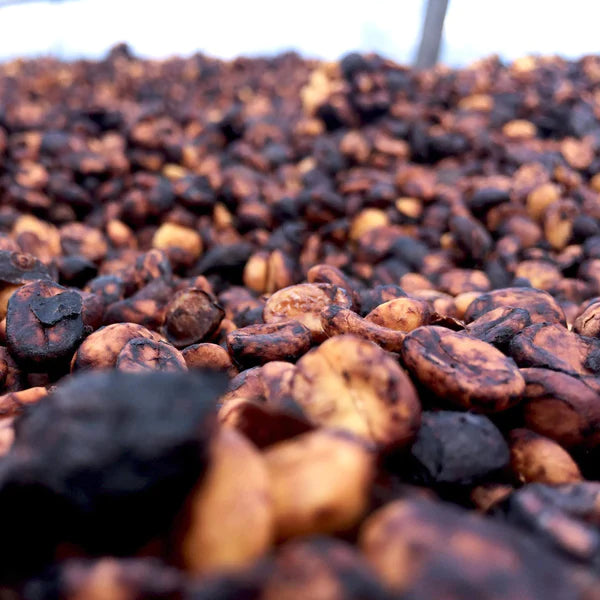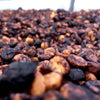Your cart is currently empty!
Costa Rica
Las Lajas Paraiso Black Honey - Sabanilla de Alajuela
€16.00
Costa Rica Filter Espresso & Moka Pot
Las Lajas Paraiso Black Honey - Sabanilla de Alajuela
A new varietal from the legendary Las Lajas Micromill: prepared as black honey, it is a sweet and syrupy coffee, with lovely pineapple acidity and intense tactile sensations. It is rich in fruity notes as red grape, plum, golden kiwi, and delicate honey notes. Roasts on , ships on
Oscar and Francisca Chacon, owners of the now-famous Las Lajas Micromill, are a third generation of coffee growers strongly oriented to quality and innovation.
The farm is located at an elevation ranging from 1500 to 1700 meters above sea level. While the primary coffee varieties grown are caturra-catuaí, the farm has been undergoing a diversification process in the last five years to introduce a wider variety of crops. The farm's soil has volcanic origins.
To enhance soil quality, the farm employs various tree species, with a focus on legumes that help absorb atmospheric nitrogen and enrich the soil. Additionally, they cultivate native trees like bananas, plantains, and oranges for family consumption. Their primary fertilizer consists of organic compost, utilizing coffee processing pulp and waste from nearby mills. This is complemented by liming amendments and minerals like K-Mag (potassium, magnesium, and sulfur). The farm employs a 20% yearly renewal system, which includes pruning and replanting of exhausted areas, and is actively engaged in an agroecological process by planting shade trees. Currently, the farm maintains an average tree density of 50 per hectare.
They are undoubtedly best known for being among the first, if not the first, to introduce the honey process in Costa Rica.
Las Lajas has adopted the honey process starting in 2008 after an earthquake had caused damages and interruptions to the channels supplying water to the mill. Oscar knew that in Brazil and Ethiopia so-called natural and pulped techniques were used for coffee processing, so he experimented with such processes on the crop that same year.
Since then, harvesting and processing are supervised with great care by Oscar and Francisca: during the harvest, the sugar content of the cherries is continuously measured with a Brix refractometer to verify the degree of ripeness, and the hand-picking begins when the value reaches a predetermined objective (22°) only. Different varieties ripen with different colors: the use of the refractometer helps to achieve a more uniform maturation, which is essential for the production of high-quality specialty natural and honey coffees.
Oscar also believes the drying curve has a fundamental impact on the coffee flavor, similar to what happens during roasting where the temperature profile heavily influences the sensory characteristics of each specialty coffee. At Las Lajas specialty coffee drying is therefore very slow and sought after, which means that production is necessarily limited.
This year they launched a new varietal, Paraiso, which is a recent hybrid between Sarchimore and Catuai.
The microlot we are offering has been processed as Black Honey: 90% mucilage left on and it is processed under shade to slow down the drying time, with the aim of obtaining a particularly intense, sweet and fruity aromatic profile, mantaining a full body.
Once lightly pulped, the beans are moved to African beds, under shade. During the first two days, they are not moved, but after that, periodic movements (3 to 4 times a day) begin to decrease the coffee's humidity. This process takes around 15 to 20 days.
The result in the cup fully reflects these objectives: it is a sweet and syrupy coffee, with lovely pineapple acidity and intense tactile sensations. It is rich in fruity notes as red grape, plum, golden kiwi, and delicate honey notes.
Minimum resting period: 10 days from roast date for espresso, 7 days for filter.
| Origin |
|---|
| Costa Rica |
| Region |
| Sabanilla de Alajuela, Central Valley |
| Producer |
| Las Lajas Micromill |
| Elevation |
| 1500 - 1700 masl |
| Varietals |
| Paraiso |
| Processing method |
| Black honey, dried on raised beds under shade |
| Roast |
|
Two profiles available: For espresso & moka pot For filter |
| Tasting Notes |
| Red grape, plum, golden kiwi, delicate honey notes. Pineapple acidity and intense tactile sensations |












